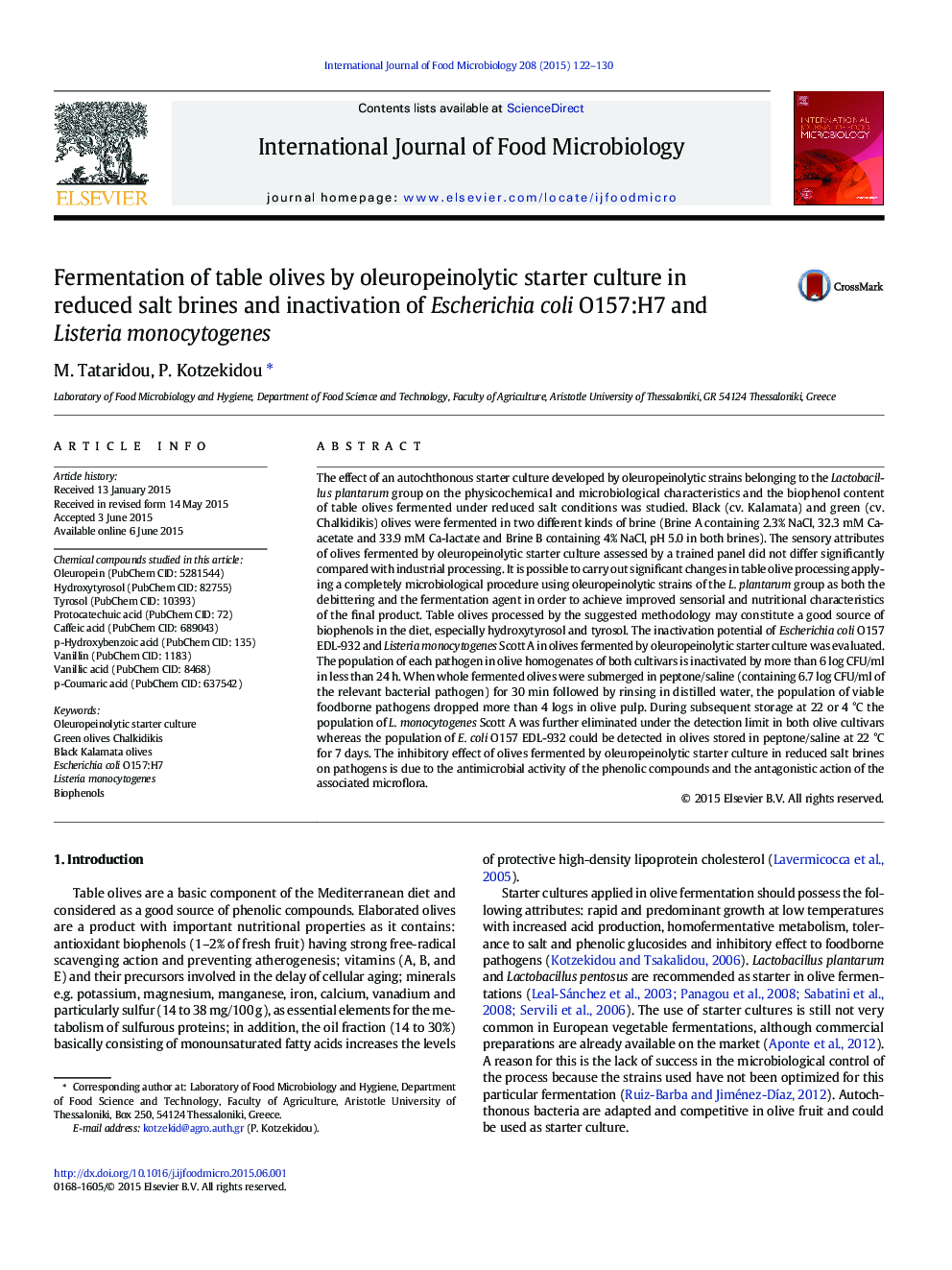| کد مقاله | کد نشریه | سال انتشار | مقاله انگلیسی | نسخه تمام متن |
|---|---|---|---|---|
| 6289899 | 1616575 | 2015 | 9 صفحه PDF | دانلود رایگان |
عنوان انگلیسی مقاله ISI
Fermentation of table olives by oleuropeinolytic starter culture in reduced salt brines and inactivation of Escherichia coli O157:H7 and Listeria monocytogenes
دانلود مقاله + سفارش ترجمه
دانلود مقاله ISI انگلیسی
رایگان برای ایرانیان
کلمات کلیدی
p-Hydroxybenzoic acid (PubChem CID: 135)Oleuropein (PubChem CID: 5281544)Hydroxytyrosol (PubChem CID: 82755)Vanillin (PubChem CID: 1183)p-Coumaric acid (PubChem CID: 637542) - p-Coumaric اسید (PubChem CID: 637542)Protocatechuic acid (PubChem CID: 72) - اسید Protocatechuic (PubChem CID: 72)Vanillic acid (PubChem CID: 8468) - اسید وانیلیک (PubChem CID: 8468)Caffeic acid (PubChem CID: 689043) - اسید کافئیک (PubChem CID: 689043)Escherichia coli O157:H7 - اشرشیاکلی O157: H7Biophenols - بیوفنل هاTyrosol (PubChem CID: 10393) - تیروسول (PubChem CID: 10393)Listeria monocytogenes - لیستریا مونوسیتوژنز
موضوعات مرتبط
علوم زیستی و بیوفناوری
علوم کشاورزی و بیولوژیک
دانش تغذیه
پیش نمایش صفحه اول مقاله

چکیده انگلیسی
The effect of an autochthonous starter culture developed by oleuropeinolytic strains belonging to the Lactobacillus plantarum group on the physicochemical and microbiological characteristics and the biophenol content of table olives fermented under reduced salt conditions was studied. Black (cv. Kalamata) and green (cv. Chalkidikis) olives were fermented in two different kinds of brine (Brine A containing 2.3% NaCl, 32.3 mM Ca-acetate and 33.9 mM Ca-lactate and Brine B containing 4% NaCl, pH 5.0 in both brines). The sensory attributes of olives fermented by oleuropeinolytic starter culture assessed by a trained panel did not differ significantly compared with industrial processing. It is possible to carry out significant changes in table olive processing applying a completely microbiological procedure using oleuropeinolytic strains of the L. plantarum group as both the debittering and the fermentation agent in order to achieve improved sensorial and nutritional characteristics of the final product. Table olives processed by the suggested methodology may constitute a good source of biophenols in the diet, especially hydroxytyrosol and tyrosol. The inactivation potential of Escherichia coli O157 EDL-932 and Listeria monocytogenes Scott A in olives fermented by oleuropeinolytic starter culture was evaluated. The population of each pathogen in olive homogenates of both cultivars is inactivated by more than 6 log CFU/ml in less than 24 h. When whole fermented olives were submerged in peptone/saline (containing 6.7 log CFU/ml of the relevant bacterial pathogen) for 30 min followed by rinsing in distilled water, the population of viable foodborne pathogens dropped more than 4 logs in olive pulp. During subsequent storage at 22 or 4 °C the population of L. monocytogenes Scott A was further eliminated under the detection limit in both olive cultivars whereas the population of E. coli O157 EDL-932 could be detected in olives stored in peptone/saline at 22 °C for 7 days. The inhibitory effect of olives fermented by oleuropeinolytic starter culture in reduced salt brines on pathogens is due to the antimicrobial activity of the phenolic compounds and the antagonistic action of the associated microflora.
ناشر
Database: Elsevier - ScienceDirect (ساینس دایرکت)
Journal: International Journal of Food Microbiology - Volume 208, 2 September 2015, Pages 122-130
Journal: International Journal of Food Microbiology - Volume 208, 2 September 2015, Pages 122-130
نویسندگان
M. Tataridou, P. Kotzekidou,